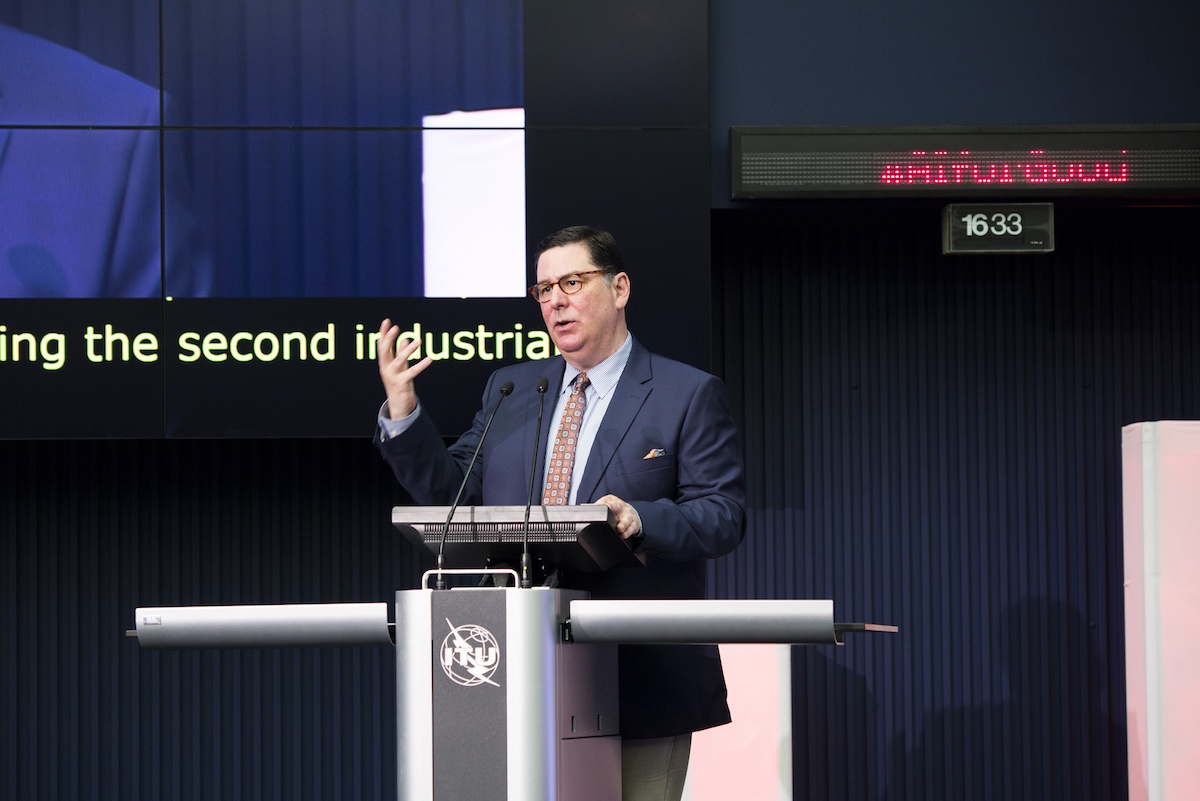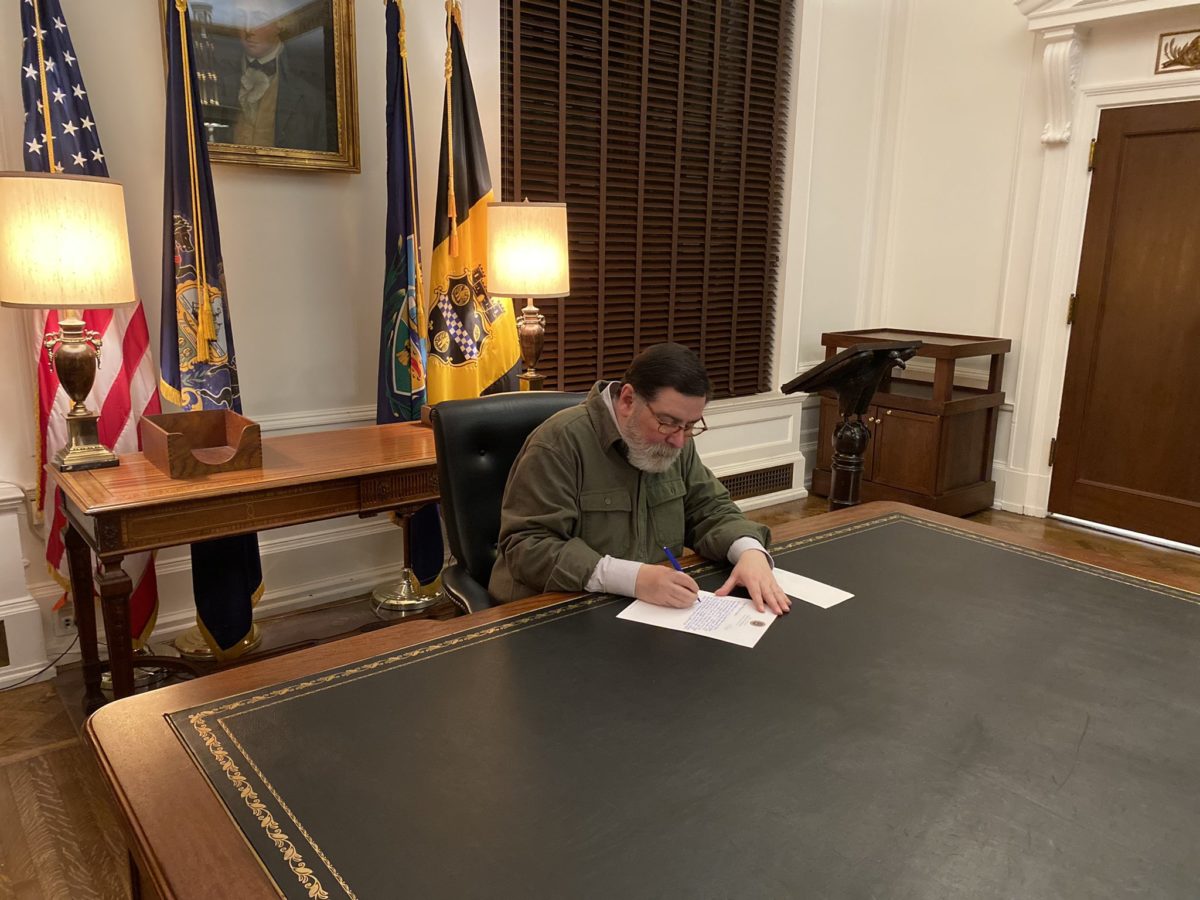With a new year comes a new mayor for Pittsburgh. After eight years in office and even more on city council prior to that, Bill Peduto moves on from city government today.
While new mayor Ed Gainey’s campaign highlighted what Pittsburgh can expect for the tech industry in the future, an exit interview with Peduto shows what we can learn from its past: Throughout his time in office, Peduto has led the charge for groundbreaking initiatives in civic tech, academic partnerships, the opening of new tech company offices and more. His proposed 2022 budget, too, set aside money for workforce development programs and electrification of city transportation.
In a conversation with Technical.ly at the close of 2021, Peduto reflected on his role in growing the tech industry, what he’s most proud of, and what he wishes he could have done better. Read excerpts from that conversation below. Plus, find out what will be next for Pittsburgh’s outgoing mustachioed mayor — including, yes, some tech consulting.
Answers from Peduto have been edited for length and clarity.
Why Peduto wanted to make tech a priority
There’s two sides to that. The one side was how tech could assist in providing better services for the City of Pittsburgh and really, what the definitions could be in creating a smart city. And then on the second, it was more of the basis of redefining the economy of the city of Pittsburgh around a tech-based economy. So that really goes back to a lot of the stuff that I was doing back as a council member representing the East End from 2001 to 2013. And a lot of the growth that we were seeing around the eds and meds and technology was starting to spread outside of the East End and into different areas of the city.
It was understood that the use of technology would become very common within local government very quickly.
At that same time, we were starting to experiment a little bit within city government. Back then, as a council member, working with a couple of people at Carnegie Mellon [University], we developed the first app for city government in the country and were able to watch it before Boston created theirs. And it was understood that the use of technology would become very common within local government very quickly. So when we came into office, we started talking directly with CMU about creating a memorandum of understanding where the university would become our research and development office, and the city would become an urban lab. That MOU would be the first of its kind in the country.
Those two paths intersected very early within our administration. From that, we just kept growing it. Multiple trips out to the West Coast and Silicon Valley. Numerous meetings in our conference room with companies throughout the country and throughout the world. The building out of the autonomous industry, into several thousand jobs within the city. The blending of that with different sectors of industry. All were very much on our radar from the very beginning, and really grew out of those 12 years on city council.
The focus on tech came straight from the community.
Two words: Cappy’s Cafe. Honestly, it’s the village approach of meeting the people who are pushing the envelopes within the tech community, getting to know them and hearing their stories on a continual basis. It’s part of what Richard Florida called the creative class. When you start to hear the type of work that they’re doing in Pittsburgh, you understand how Pittsburgh is positioned in a real way to be a global leader.
This was all a part of planting the seeds a decade before I ever became mayor. And in our administration, having somebody like Debra Lam, who was our first director of innovation and performance, was absolutely critical in setting up the capacity of a city government with a startup mentality, and an ability to truly invest in innovation and the ability to have people on board who could speak the language, was another key part of our first few years of being able to do the same.
Civic tech upgrades are among Peduto’s proudest achievements.
Internally, we upgraded everything. [We did an] overall overhaul of the technology of city government, and we brought it into the 21st century. We basically allowed the entire system to die on the vine while we built an entirely new system and put it in into place. We brought city services from standing in lines to getting online and we did it within an eight-year period. And we were able to do it without breaking the bank.
As far as the local economy, we were worked hand in hand with the AI and robotics industry, in order to excel the industry. It opened the door for understanding a wild fever to choose Pittsburgh over Arizona, Boston and San Francisco that brought in over a thousand jobs and $2 billion dollars of investment without any government subsidy. That then opened the doors wide for Argo AI, Aurora and so many others and all of the other ancillary companies that have moved in and have created thousands of jobs in just a five-year period, and have invested billions of dollars into building out an entirely new industry within the city, working hand in hand with city government.

But expanding partnerships and new business deals are among what he wishes he could’ve done better.
Early on with Uber, when Travis Kalanick was the CEO, I should have gotten [some] agreements in writing. [Editor’s note: Uber launched an office in Pittsburgh in 2014 and ramped up its autonomous vehicle testing here in the following years. Aurora purchased Uber ATG in 2020.]
There was a lot that was being discussed that would have been beneficial to the city and society that we had discussed that never came through. Obviously, the investment in the jobs was important, but we were looking for the opportunity of mobility to assist with helping people to get to their doctor and to get to food and to be able to provide those who had limited access to be able to have greater transportation options. And that never happened.
There were a lot of companies that we met with that we tried to bring to Pittsburgh that we weren’t able to land. You’re never going to be able to bat 1,000, so I think we did a fairly good job. I think that the two areas where the next administration should truly focus in on that have the biggest potential to be the next big growth area for Pittsburgh over the next decade are the life sciences and green tech. I intend to work in a consulting capacity in the next part of my career, and I’m going to be focusing in at least on the clean and green tech component. I believe there’s a lot of potential to bring companies here and to expand portfolios of existing companies.
Community organizations can continue the tech-focused economic development work that began in Peduto’s administration.
I wouldn’t want to answer for them, so I would not try to guess what their priorities would be, but I do know that the URA [Urban Redevelopment Authority] is aligned and has some capacity to continue to do the work that we have started. And it has the talent to be able to continue.
One of the organizations that we were a partner with along with Carnegie Mellon, University of Pittsburgh, Hillman Foundation, Heinz Endowments and UPMC, as well as the county, is InnovatePGH. And I believe that they will be picking up a large part of what we had been doing as well. So between those two organizations, I think you have the economic development capacity to continue to focus in on growing eds, meds and tech industry sectors for the city.
Collaboration and open mindedness is key to tech’s success in Pittsburgh.
Embrace the technology industry as the growth potential of Pittsburgh.
If it isn’t a priority, at the very least, [politicians should] create a welcoming environment. Don’t allow it to be a hostile, anti-tech type of environment. Embrace the technology industry as the growth potential of Pittsburgh. There is a small sentiment out there that is anti-technology, or simply anti-large corporation. Don’t allow that to curtail very real potential of Pittsburgh’s economic comeback and the potential future reemergence of Pittsburgh to return to the global state. There’s too much talent here and too much opportunity to allow that type of thinking to prevail.
Within the industry, there needs to be more discussions on cross-sectionality, of how industries can adapt. You see it happening in other cities, where life sciences and automation start to work together. There needs to be more of a categorization of what type of research is being done within the city and where more people working in that type of research have the opportunity to know what’s being made available. They have the ability to communicate [about] how they can add on by adapting their expertise, and where Pittsburg can create completely new types of innovation. I think that is the next great phase of where these industries start to collaborate.
A future role in big government might be on the table, but tech-related consulting will be Peduto’s new focus.
I am going to be moving into a consulting. I’ll be creating my own company as an S corporation that will be consulting with private companies, mainly from outside of the state of Pennsylvania. [I’m] looking at least at 2022 as a short runway in consulting, helping companies over the course of the year, potentially longer. But I’m still having conversations with the Biden administration about potentially joining them for 2023 and 2o24. So taking it, basically, year by year for the next few years.







